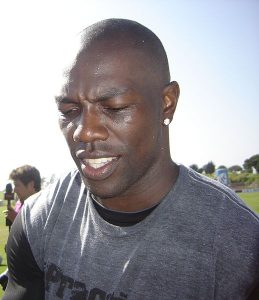Ab muscle-comparisons included, you probably have little in common with former NFL great Terrell Owens – he of 153 career touchdowns, Sharpie pen and now Dr. Phil fame.
That’s fortunate.
These days, T.O. is in a high-profile struggle to find work, pay his child support (why he was on Dr. Phil with the mothers of his children) and hold on to his house and cars. He says he’s somehow managed to squander most of the $80 million he made in his 14-year pro football career.
Old #81 may operate on a different plane than many of us – financially and otherwise. (See this top 5 list of the oddest T.O. moments).
Still, his financial collapse offers 5 important lessons for pretty much everyone:
1) Track your investments
Early in his career, this is where T.O. went wrong. As he told Blacksportsonline.com:
Basically I was relying on my financial advisers to handle my financial portfolio and they took a lot of the stress from me being involved in my finances, telling me to focus on football, that they have my best interests at heart.
Now T.O. claims adviser Jeff Rubin encouraged him to sink millions into real estate just before the bubble burst.
Whether or not T.O. did get bad advice, there is only one person in charge of your money, and whether you’re #81, Ocho Cinco, or a sports zero, that’s still Numero Uno.
As it relates to investments, getting financial advice can be smart. But beware of “unique” investment opportunities; they’re often a one-of-a-kind way to lose money.
One other tip: Don’t chase super-high returns. Instead, find a manager who does not lose more than the market loses in downturns. If you can do that and simply keep pace in the upturns, you’re well on your way.
2) Save your money
T.O. says he didn’t even live lavishly. And now he’s broke.
That was far less likely to happen, though, had he been saving consistently for a rainy day.
Nearly 80 percent of NFL players are bankrupt or under financial stress within two years of retirement.
I would venture to say that most of them did not follow this rule.
The “average” person needs to be saving at least 5 to 10% of their earnings – possibly more.
If you want to retire early or you happen to be a professional athlete — knowing that you will retire very early — you need to be saving a lot more than that!
3) Diversify
It’s hard to know exactly how much, but it seems that T.O. had a large percentage of his investments in real estate.
T.O. owned multiple homes, and none of them were over-the-top fancy. Still, together, the mortgage payments were apparently over $750,000 a year.
In addition, T.O. was an investor in an Alabama-based entertainment complex that included electronic bingo. He spent $2 million on the investment, and it went belly up.
If you already own your home, you might want to talk to an adviser before loading up on even more real estate.
Why double down?
That’s true for any asset class, for that matter. Own a mix of stocks, bonds, commodities and real estate.
Within each of those groups, mix it up. Own domestic and foreign stocks, large caps and small caps. Have bonds in multiple durations, different yields, some government and some corporate. And own a mix of commodities that includes agricultural ones – not just oil, gas and gold.
4) Get married, stay married
Hey. Marriage isn’t for everyone. It wasn’t for T.O., who has stayed single all his life, fathering four children with four different women.
But studies show that people who get married and stay married accumulate nearly twice as much personal wealth as people who are single or divorced.
It’s not a social commentary: It’s obvious.
Adults living together under one roof spend less on mortgages and living expenses than those living separately. And you’ll lose MORE than half of what you own in a typical divorce: 75% of your net wealth, on average.
In T.O.’s case, he spends $44,600 each month on child support, in addition to several homes that he has purchased for the mothers of his children.
5) Take Action Early
I don’t know T.O.’s finances intimately, but I am pretty sure that he didn’t burn through $80 million overnight. It took years of financial missteps to reach his current financial state.
And while he clearly made some big mistakes — like his $2 million gambling resort investment — that alone did not empty his bank account.
My guess is that there were likely a long list of small mistakes that did their damage over time , ones that also may involve spending habits.
My advice? Don’t wait until the money is gone to fix your financial problems. Talk to a financial planner if necessary. You can find one here.
You need to know where your money is at all times. More dollars need to be coming in than going out each month. Doing that is a lot easier these days with services like Mint.com.
Sign up if you have not done so already and start categorizing your spending.
Photo: Tammy Ferrufino




